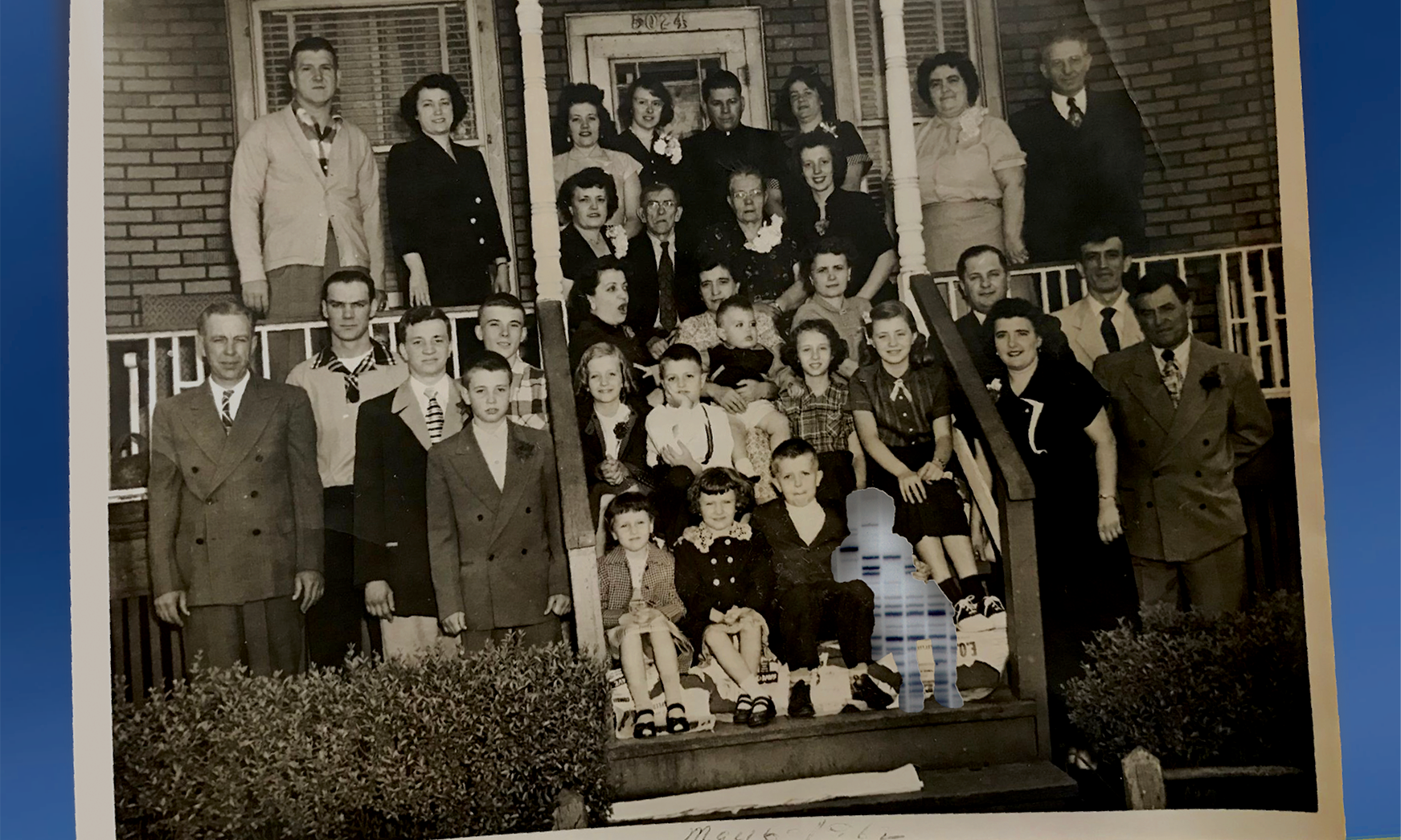TALKING POINTS
Feel free to ask Jeremy about…
- How this journey has affected him, Edie and their relationship
- His book writing process
- Why he partnered with indie bookstores
- His previous life as a comedian, football official and Mardi Gras float captain
- The implications of DNA services like Ancestry and 23andMe
- The demise of satire
SAMPLE Q & A
Why did you write Edie’s story instead of Edie?
For starters, I’m literally married to my subject. More importantly, though, had it been left to Edie, this book never would’ve happened. While she’s an award-winning copy editor with a genuine talent for writing, her humility wouldn’t allow her to see what I gradually realized while accompanying my wife on this surreal journey: Edie’s incredible story is one the world desperately needs right now.
Our brave, reluctant hero values her privacy, as well as that of those she loves. Edie persistently eschews the spotlight, which is why it’s nothing short of a miracle that she’s come to realize her story begs to be added to the human narrative.
What do you think is the heart of this story?
Edie’s selfless agenda is the heart of this powerful story of healing, and sets it apart from other works about similar searches. As I explain to readers, my wife’s humility wouldn’t allow her to admit that submitting her DNA was an altruistic act, fraught with potential peril of causing and/or becoming embroiled in a bunch of strangers’ drama. From her point of view, Edie was simply putting herself out there in case someone was looking to close an undoubtedly painful chapter in her life. Her maternal search was compelled not by a need to know, but rather a need to answer all the troubling questions vexing her father after the fellow AncestryDNA user was pleasantly surprised to learn about his eldest daughter.
I also write about how Edie’s exceedingly considerate nature is the most ideal trait anyone could have in what would become a yearlong-plus exercise in discretion, patience and empathy, three suits in which my wife is all aces. Our reluctant hero successfully dodged all the traps that could have turned this unicorn of a real-life family saga into a darker version of the insane yet heartwarming tale that it is. Like Indiana Jones, my wife chose wisely.
What do you hope readers come away with?
As I explain in the book, Edie is the last person on Earth who would ever bust into someone’s life unannounced like the Kool-Aid Man. I hope readers see what I do: a connection between her considerate nature and the rarity of our story. I’ve come to believe that you can hunt for unicorns all day, only to scare them off with even the slightest hint of selfishness.
While there’s no reference manual for handling such discoveries, Edie’s approach was nothing short of “textbook.” I’m so thankful my wife adamantly refused to take a shortcut, opting instead to lead an uncertain journey, one proving that—in a rush-rush world—you never know who you’ll run across on the scenic route. Some of them may share your nose, eyes, and even your heart.
What’s your take on the role of DNA services like Ancestry and 23andMe?
Readers should know that I believe DNA is this generation’s Pentagon Papers. It reveals secrets that the old folks never imagined the kids ever discovering. DNA technology serves as a bellwether indicating that the age of lasting secrets is over. Of course, the flip side to that is the growing debate about privacy in the information age. The bottom line is that, if you are or were a horrible person, it’s getting harder and harder to hide that fact from the rest of humanity.
How has the pandemic affected the development of all these new relationships created by Edie’s journey?
It definitely stifled our ability to comfortably spend precious time with these wonderful people we’d just discovered. An Austin gathering of paternal family that was originally scheduled for April 2020 was significantly scaled back and postponed to October 2021. And in July 2022, we dusted off our TSA PreCheck for a gathering of paternal folks in Hawaii, where I finally got to hang out again with my new BFF, who’d grown up so much since our last visit. Our niece Hadley had gone from 6 to nearly 10 years old.
We’ve always been cautious with COVID, especially before vaccines were available. We had begun connecting with new family just before we couldn’t even responsibly visit previously known family. That’s when this story began to read like one written in another age, when air travel was far less perilous and we could safely hug strangers.
How has writing your first book—a personal, hopeful one on the eve of increasingly dark days—affected you as a self-described tenured cynic?
As I explain in the final chapter, I realized early on in the writing process that the world could stand fewer assholes being assholes for the sake of being assholes. I began to focus more on being grateful as I became increasingly mindful of just how lucky I am. The pandemic would confirm that realization and many others gleaned along the way.
My Twitter handle represents my previous identity, before we embarked on this journey. I started 2018 as “comicref.” By the end of 2019, I had abandoned my satire site and capped off my officiating career. My focus shifted to this project, and then later, several other books that I’m actively working on. It’s amazing how much bandwidth daily news cycles and multiple football rule books can take up in one’s head. With the cache cleared, the ideas suddenly started popping up, like countless stars you can finally see in the night sky once you get away from the light pollution.
Honestly, it felt weird composing a media kit, like I was designing my new identity before finally emerging from my cocoon. It’s like I started writing this book as Dick Whitman and published it as Don Draper. I will concede, however, that writing and publishing this book was just a little less arduous than fighting in the Korean War.
What was it like working on the book while the story was still playing out?
As readers know, by Chapter 26, after multiple people had already suggested we write a book, I’d begun recording notes during our travels. By Chapter 31, I started curating source material. That took over a month to do. And by Chapter 34, I’m working on the first draft (Chapter 11, in particular). I distinctly remember feeling during that time like a documentarian who worries that his involvement with the subject might unduly influence what unfolds. I feared getting in the way of a beautiful story.
Edie and I were still navigating a tsunami of the surreal when I quit my sad excuse for a day job to immerse myself in all the curated experiences, to relive them all over again, day after day. I knew it would be a tall order getting this story out into a world desperately in need of it, so I jumped all in, even as our journey continued in real time. I sometimes say that this journey gave the two of us a two-year head start on acclimating to the surreal. This process sort of forced me to process the surreal in real time, in order to help explain it to others later.
Can you explain why Chapters 3 through 10 lead off with summaries of weather in Baton Rouge?
Those eight chapters each cover one day, midnight to midnight, like extended diary entries. I never kept a diary growing up, but if I did, I likely would’ve started each entry with a description of that day’s weather, because I’m a weather nerd who used to read my grandfather’s almanacs. The summaries serve to emphasize that the events described in each of those “crazy eight” chapters take place in a single 24-hour period.
Since I couldn’t find a consensus between various sources of pertinent weather data on the internet, I reached out to a friend, WAFB-TV Chief Meteorologist Jay Grymes, to ensure accuracy. (Like I said, I’m a weather nerd.) In addition to writing complete daily overviews, the former state climatologist even composed a custom-made animated gif showing precipitation over those eight days, as well as a detailed PowerPoint of various weather patterns for that period.
What can readers expect from you in the future?
I’m currently working on a few projects, including a book I’ve titled “Cajun Shame: Demise of a Centuries-Old Culture.” It explores the various forces that led to me never having a legit conversation with my paternal grandmother, who lived nearby until she passed away when I was 15 years old. Like earlier generations of Acadian ancestors in South Louisiana—going back to before it was even a state—she spoke only Cajun French, which was deliberately not passed down to me and my generation. I’m also collecting notes for a project to examine how football is the American metaphor, while another future book explains how the so-called Greatest Generation went overseas to defeat fascism, only to come home and raise a ginormous generation largely incapable of detecting such movements in their midst.
And if readers are wondering about a spinoff book about Edie’s father, there are plans for that, too. In fact, I had barely begun working on the first draft of “The Little Girl” when a dear friend with considerable knowledge about the publishing industry agreed to meet me for lunch, to assuage my fear that I was crazy to believe I had an insanely beautiful story on my hands. After two-and-a-half hours of me telling her all about it, she finally picked her jaw up off the table and told me that I didn’t have a book. She insisted, instead, that I had a series of books. “The father,” she said, “he gets a book.” My new brother-in-law fortunately has hours and hours of recordings of John Hart sharing all of the insane stories from the complicated man’s incredible life. That’s definitely going to be an interesting one to work on.
FUN FACTS
Jeremy obtained an FCC license before his driver’s license. As a high school junior, his first employer was KJIN-AM, Houma, Louisiana’s oldest radio station, where he was the Saturday overnight DJ.
Edie had a pet ball python named Camo when she met Jeremy at LSU.
As the referee for LSU’s 2019 Spring Game in Tiger Stadium, Jeremy spent an afternoon in the offensive backfield with that year’s eventual Heisman Trophy winner, Joe Burrow, who ended up leading the Tigers to the National Championship later that season.
Jeremy once opened for Weird Al Yankovic with a solid twenty minutes of stand-up that felt like five.

In a Jeopardy! Tournament of Champions episode from November 4, 2022, The Red Shtick served as an $800 Double Jeopardy! clue. Jackie Kelly correctly answered, “What is Baton Rouge?”

